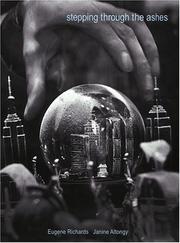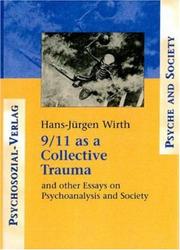| Listing 1 - 10 of 137 | << page >> |
Sort by
|

ISBN: 1931788014 Year: 2002 Publisher: New York (N.Y.) Aperture
Abstract | Keywords | Export | Availability | Bookmark
 Loading...
Loading...Choose an application
- Reference Manager
- EndNote
- RefWorks (Direct export to RefWorks)
Book
ISBN: 1443859591 9781443859592 9781443853439 1443853437 Year: 2014 Publisher: Newcastle upon Tyne Cambridge Scholars Pub
Abstract | Keywords | Export | Availability | Bookmark
 Loading...
Loading...Choose an application
- Reference Manager
- EndNote
- RefWorks (Direct export to RefWorks)
This collection of essays offers a rich variety of approaches to how people and institutions in greater New York have sought to find meaning in the 9/11 attacks on the World Trade Center, now a decade on. The views and practices documented here join memory, recovery, and rebuilding together to form a vital new chapter in New York's metropolitan history. Contributors contest the dominant nationalist narrative about 9/11 to generate a more local and socially-engaged form of scholarship that co...
Book
ISBN: 1443869171 9781443869171 Year: 2014 Publisher: Newcastle upon Tyne Cambridge Scholars Publishing
Abstract | Keywords | Export | Availability | Bookmark
 Loading...
Loading...Choose an application
- Reference Manager
- EndNote
- RefWorks (Direct export to RefWorks)
""The effects of 9/11 ramify through a network of conduits and pathways, including the examples of expressive culture this volume explores; and the registration of those effects will likewise be felt in an array of documents and texts. The cultural, literary, and mass mediated effects of 9/11 encompass the globe and the chapters in this volume assume a transnational and international range of vantage points. The topics examined include the representation of Islam and Moslems in a number of te...
Book
ISBN: 0857458647 Year: 2004 Publisher: New York : Berghahn Books,
Abstract | Keywords | Export | Availability | Bookmark
 Loading...
Loading...Choose an application
- Reference Manager
- EndNote
- RefWorks (Direct export to RefWorks)
Numerous humanly caused destructions of just the last hundred years dwarf the World Trade Center disaster, and the attention still addressed to it may over the next few years appear disproportionate. But the significance of events is always determined by the social, political, and cultural forces that are articulated through a particular event. The attack of 9/11 was an event waiting to happen, and when it did occur the even itself became a catalyst and impetus for the changing and redirection of global realities. This volume offers provocative assessments of the reaction to the event from
Book
ISBN: 0253015634 9780253015631 9780253015495 0253015499 9780253015563 0253015561 Year: 2015 Publisher: Bloomington
Abstract | Keywords | Export | Availability | Bookmark
 Loading...
Loading...Choose an application
- Reference Manager
- EndNote
- RefWorks (Direct export to RefWorks)
The day the towers fell, indelible images of plummeting rubble, fire, and falling bodies were imprinted in the memories of people around the world. Images that were caught in the media loop after the disaster and coverage of the attack, its aftermath, and the wars that followed reflected a pervasive tendency to treat these tragic events as spectacle. Though the collapse of the World Trade Center was ""the most photographed disaster in history,"" it failed to yield a single noteworthy image of carnage. Thomas Stubblefield argues that the absence within these spectacular images is the paradox of

ISBN: 0881634344 1138009903 1134914067 0203780663 9781134914067 9780203780664 9783898063722 3898063720 9780881634341 1138872598 113491413X Year: 2005 Publisher: New York : Florence : New York : Florence : Routledge Taylor & Francis Group [distributor] Routledge Taylor & Francis Group [distributor]
Abstract | Keywords | Export | Availability | Bookmark
 Loading...
Loading...Choose an application
- Reference Manager
- EndNote
- RefWorks (Direct export to RefWorks)
Annotation
September 11 Terrorist Attacks, 2001 --- Psychological aspects. --- Social aspects.
Book
ISBN: 1501302035 144115289X 1441180427 9781441152893 9781501302039 9781441155894 1441155899 9781441180421 Year: 2014 Publisher: New York : Bloomsbury Academic,
Abstract | Keywords | Export | Availability | Bookmark
 Loading...
Loading...Choose an application
- Reference Manager
- EndNote
- RefWorks (Direct export to RefWorks)
"This examination of Al Qaeda's decline since the 9/11 attacks focuses on the terror organization's mutation and fragmentation. It looks at its partnership with the local and regional jihadist networks that played a pivotal role in the Madrid, London, and Fort Hood attacks, arguing that, although initially successful, such alliances actually unraveled following both anti-terror policies and a growing rejection of violent jihadism in the Muslim world. Challenging conventional theories about Al Qaeda and homegrown terrorism, the book claims that jihadist attacks are now organized by overlapping international and regional networks that have become frustrated in their inability to enforce regime change and their ideological goals. The discussion spans the war on terror, analyzing major post 9/11 attacks, the failed jihadist struggle in Iraq, Al Qaeda's affiliates, and the organization's future prospects after the death of Osama Bin Laden and the Arab Spring. This assessment of the future of the jihadist struggle against Muslim governments and homegrown Islamic terrorism in the West will be an invaluable resource to anyone studying terrorism and Islamic extremism."--Bloomsbury Publishing.
September 11 Terrorist Attacks, 2001. --- Terrorism. --- Qaida (Organization)
Book
ISBN: 1476639477 9781476639475 9781476680439 1476680434 Year: 2020 Publisher: Jefferson, North Carolina
Abstract | Keywords | Export | Availability | Bookmark
 Loading...
Loading...Choose an application
- Reference Manager
- EndNote
- RefWorks (Direct export to RefWorks)
"For understandable and inevitable reasons, the colloquially termed "9/11" is most symbolically linked to the World Trade Center. The Pentagon's destruction received far less coverage, but those who helped extinguish the fires, tend to the wounded, and clean up the aftermath will never forget such a loss. Thousands took part in the Pentagon recovery effort following 9/11, but few knew exactly what they were signing up for. A nearby Army unit, the 3rd United States Infantry Regiment (The Old Guard), sent its soldiers to contribute where they could, as best they could, and in any capacity they could. In this book, soldiers of The Old Guard have elected to share their experiences. Their accounts attest to the honor and camaraderie that were necessary for picking up the pieces, as well as the traumatic effects of being enveloped in the aftermath of tragedy."
September 11 Terrorist Attacks, 2001. --- United States. --- History
Book
ISBN: 1476627002 9781476627007 9780786499021 0786499028 Year: 2017 Publisher: Jefferson, N.C.
Abstract | Keywords | Export | Availability | Bookmark
 Loading...
Loading...Choose an application
- Reference Manager
- EndNote
- RefWorks (Direct export to RefWorks)
"This critical study of video games since 9/11 shows how a distinct genre emerged following the terrorist attacks and their aftermath. Comparisons of pre and post-9/11 titles of popular game franchises reveal reshaped notions of identity, urban and suburban spaces and the citizen's role as both a producer and consumer of culture"--
Video games --- September 11 Terrorist Attacks, 2001 --- Social aspects. --- Influence.
Book
ISBN: 1501313215 1501313231 1501313223 9781501313226 9781501313219 9781501313196 1501313193 Year: 2016 Publisher: New York : Bloomsbury Academic,
Abstract | Keywords | Export | Availability | Bookmark
 Loading...
Loading...Choose an application
- Reference Manager
- EndNote
- RefWorks (Direct export to RefWorks)
"Writing the 9/11 Decade investigates the relation of the novel to reportage, and the role of both in shaping culture, by looking at novelists' journalistic responses to the September 11 attacks. Journalist and academic Charlie Lee-Potter argues that novelists were entrapped by the expectation that they would provide an immediate non-fiction response to 9/11. Beginning with an examination of the sometimes mawkish writing that emerged in the days after the attacks, Writing the 9/11 Decade traces the evolution of literary journalism -- in writers such as Ian McEwan, Paul Auster, Don DeLillo, Mohsin Hamid and Nadeem Aslam -- into new methods of subsuming the disaster, while attempting to stand apart from it. It includes interviews with novelists such as Richard Ford, Amy Waldman and Kamila Shamsie, as well as the only longform interview granted by the former Archbishop of Canterbury, Dr Rowan Williams, who is himself a 9/11 survivor. In assessing the novel's capacity to respond to and contain an unimagined traumatic event, Writing the 9/11 Decade stands as a contemporary history of the form."--Bloomsbury Publishing.
| Listing 1 - 10 of 137 | << page >> |
Sort by
|

 Search
Search Feedback
Feedback About UniCat
About UniCat  Help
Help News
News